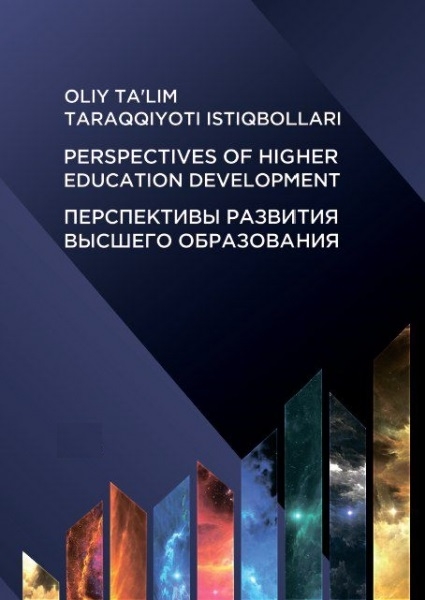
National Erasmus+ Office and National team of HEREs of the Republic of Uzbekistan invite authors for publication in the Scientific and Methodological Journal
"PERSPECTIVES OF HIGHER EDUCATION DEVELOPMENT"
Peer-reviewed scientific and methodological journal of National Team of HEREs
"PERSPECTIVES OF HIGHER EDUCATION DEVELOPMENT"
founded in 2020
It has been published as a scientific and methodological collection since 2011.
http://www.erasmusplus.uz/ru/publication/expert-Publications/index.htm
The purpose of the journal is to improve the efficiency of the educational process in the Republic of Uzbekistan by analyzing and informing about progressive methods, achievements, trends and problems in the field of higher education.
The journal will be published with the organisational support of the Ministry of Higher and Secondary Specialised Education of the Republic of Uzbekistan.
The collection was published with the organisational support of the National Erasmus+ Office in Uzbekistan, “NEO Hamkor”. The publication is funded by the Erasmus+ Programme of the European Union. The material in this publication does not reflect the views of the European Commission.
EDITORIAL BOARD
Abdurakhmanova Aziza Karimovna, Coordinator of the National Erasmus+ Office in Uzbekistan, Candidate of Philological Sciences
Begimkulov Uzokboy Shoimkulovich, Deputy Minister of Higher and Secondary Specialised Education of the Republic of Uzbekistan, Doctor of Pedagogical Sciences, Professor
Vikhrov Igor Petrovich, leading specialist in the development of medical education in the Innovation Center of the Tashkent Pediatric Medical Institute, HEREs, Uzbekistan
Galak Oksana, Lecturer, Faculty of Business, Economics and Statistics, PhD, University of Vienna, Austria
Zakirova Gulnara Demeshovna, Associate Professor, Candidate of Pedagogical Sciences, International University of Information Technologies, Kazakhstan
Kasymova Nazokat Anvarovna, Professor of Tashkent State University of Oriental Studies, Doctor of Historical Sciences, expert of higher Education, Uzbekistan
Maria Monova-Zheleva, Associate Professor, Doctor of Science, Burgas Free University, Bulgaria.
Rikhsieva Gulchehra Shavkatovna, Rector of the Tashkent State University of Oriental Studies, Associate Professor, Candidate of Philological Sciences, expert of higher education, Uzbekistan.
Rakhmatullayev Marat Alimovich, Professor of the Tashkent University of Information Technologies, Doctor of Technical Sciences, HEREs, Uzbekistan.
Tashkenbayev Ulugbek Negmatovich, Head of the State Inspectorate for Supervision of the Quality of Education under the Cabinet of Ministers of the Republic of Uzbekistan, Doctor of Physical and Mathematical Sciences, Professor.
Usmanov Botir Shukurillaevich, Rector of the Tashkent Chemical-Technological Institute, Associate Professor, Candidate of Technical Sciences.
Usmanova Nargiza Bakhtiyorbekovna, Associate Professor of the Tashkent University of Information Technologies, Doctor of Technical Sciences, expert of higher education, Uzbekistan.
Eshkabilov Sulaimon, Associate Professor, Jamestown University, USA.
The subject of the publication:
· Modern challenges for the higher education system of the Republic of Uzbekistan
· Higher education and the digital economy
· Credit-modular system in HE
· Educational platforms as a means of intensifying the training of highly qualified personnel
· University autonomy
· Innovative methods in higher education
· Professional development in HE
· Erasmus+ Programme
· Problems and prospects of investment in higher education
· Experience of foreign countries in the development of higher education
· Related topics that reflect the development of higher education
REQUIREMENTS FOR ARTICLES
1. Content requirements:
The content of the article should cover one or more topics of the issue sections and correspond to the main topic, be previously unpublished, analytical, contain elements of scientific novelty, and have useful information for the development of higher education. It is recommended to adhere to the international structure-IMRAD (Introduction, Methods, Results, and Discussion).
2. Requirements for the design of articles:
1) "Information about the authors" (in a separate file in the original language?)
• FULL name (in full)
• Position and place of work
• City, country
• Academic title, academic degree,
• Field of scientific research (no more than 2 lines)
• Email address
2) Articles lead to the standard form, according to the scheme:
ARTICLE STRUCTURE:
In the original language:
· Full name (in lowercase)
· Title of the article in BLOCK letters
· Abstract
· Keywords
· Article
· List of references
In English:
· FULL name
· Title of the article in BLOCK letters
· Abstract
· Keywords
FORMAT
Number of pages - from 10 to 15, interval-1.0
Font: Times New Roman, 14
Abstract in the language of the article and abstract in English
Keywords (from 5 to 7 words or phrases)
Page margins: top, bottom, left , right-2.5 cm
Page numbering in the lower right corner
Abstract requirements (in the original language and in English)
The abstract should be an independent text and should be devoted to the article that the research conducted, not to the subject of the study as a whole. It is a brief but informative summary of the article. In the abstract, it is not allowed to use formulas, abbreviations, references and literature review.
Important! The abstract should be written in one paragraph in the original language - 500-600 characters (about 100 words), in English – 1200-1250 characters (about 200 words).
Requirements for the List of References
The list of references have to be in alphabetical order, with end-to-end numbering. References in the text should be made in square brackets, for example, [12]. The list of references should contain at least 10 sources, and it is also important that the authors take into account foreign research when preparing the publication. It is advisable, unless absolutely necessary, not to use sources published earlier than 5-8 years ago and not to overuse self-citation, which should not exceed 20% of the total number of sources in the list of references.
All the items in the list should be referenced in the text of the article, and all the mentioned literature should be listed in the list of references. It is important to adhere to the relevant standards of bibliographic description (for example, GOST 7.1 - 2003, etc.).